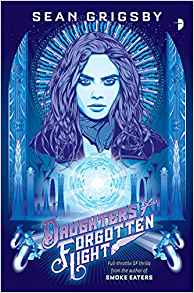Liz Bourke Reviews Daughters of Forgotten Light by Sean Grigsby
 Daughters of Forgotten Light, Sean Grigsby (Angry Robot 978-0857667953, $12.99, 352pp, tp) September 2018. Cover by John Coulthart.
Daughters of Forgotten Light, Sean Grigsby (Angry Robot 978-0857667953, $12.99, 352pp, tp) September 2018. Cover by John Coulthart.
I came away from Sean Grigsby’s debut novel, science fiction pulp extravaganza Daughters of Forgotten Light, deeply entertained, and moved by its apparent feminism and queer-inclusiveness – the latest in Angry Robot’s (really quite strong) feminist, queer-inclusive and fun pulp list. Further consideration, though, leaves me re-evaluating my initial impressions.
Don’t get me wrong. It’s still fun as hell, but it falls prey to a handful of really common and predictable tropes, especially around queer folks, and any assessment of the novel as a whole should take those into account.
Daughters of Forgotten Light sets itself in a dystopian future – a future America locked in an endless eastern war with a successor state to Russia and China, and threatened by environmental apocalypse. In this future, young women who’re deemed unsuitable for the military by the government and who are unwanted by their parents are sent to an abandoned space platform, a space prison from which there’s no return. Out of sight, out of mind: they’re shipped very basic food when new prisoners come in.
The novel sets itself largely in that space prison, which is known as Oubliette. Oubliette is run by three gangs: the all-black O.C., the cannibalistic Amazons, and the gang which contains two of the novel’s three main protagonists (gang leader Lena Horowitz and newbie Sarah Pao), the eponymous Daughters of Forgotten Light. These gangs have worked out some interesting technology based on the materials available in Oubliette: flying motorbikes (called cyclones), energy weapons, the works. They just have no way out.
As Daughters of Forgotten Light begins, there’s a tentative truce between the gangs. But then the latest shipment to Oubliette contains something unprecedented: among the girls, there’s a baby. The Amazons want the baby. The other gangs want the baby, too. When the Amazons get the baby, the truce is ripe for a breakdown. Meanwhile, back on Earth, an American Senator (who’s just secretly had a baby and given it up for adoption – that couldn’t be tied in to the baby on Oubliette at all, could it?) is asked by her Vice President to secretly investigate Oubliette, and see if it is actually still suitable for habitation, since the government has no eyes on the place at all and Earth’s environmental disaster is slowly overtaking the Americans’ ability to keep their continent largely habitable. Oubliette may end up as the lifeboat of the elite….
But the women of Oubliette are survivors, red in tooth and claw. (Even if some of them, like Lena “Horror” Horowitz, have serious anger control issues.) They want to get back to Earth – but if Oubliette becomes a battleground, they’re not going to give it up.
Daughters of Forgotten Light is a fast-paced, tense, and fun novel, with science fictional motorbike gangs and a cast composed largely of badass women (two things that go really well together), with good dialogue and compelling characterisation. All of the women feel like real people. Grigsby also manages a diverse and inclusive cast: at least one of the narrators, Sarah Pao, is asexual and possibly aromantic, while another is Jewish, and the senator (also a viewpoint character) is a black woman.
However, if Grigsby was aiming to be queer-friendly, inclusive, and feminist with this novel, he had a somewhat sloppy approach. There’s one trans character, a woman (who also has feelings for women). Her trans-ness is revealed via a naked shower scene in which her genitals are a subject of conversation, and her backstory involves a brutally anti-trans father. This single trans character dies by the novel’s end.
The novel shows two relationships between women, one very briefly and in retrospect, both of which end with one of the parties dead. Another female character is aggressively interested in women as sexual partners, but is never shown with a partner or in a relationship, and her aggressive interest comes across as somewhat predatory. There is one briefly-shown and relatively-sympathetic male character, who’s gay. He also dies. For a novel with a lot of queerness and implied queerness in it, it’s awfully full of dead lesbians and buried gays.
I’m also side-eyeing, just a little, the way in which all the gang leaders on Oubliette go wildly acquisitive over the baby. They want the baby! They want the baby enough to go to war over it! It plays a little into the (misogynistic) idea that the vast majority of women are baby-starved and dying to fulfill a maternal imperative. In Daughters of Forgotten Light, the baby is used to dramatic effect and is an entertaining McGuffin, but still.
Grigsby’s worldbuilding is also a little batshit. It’s basically an excuse for an all-female Space Prison (we all wave to Bitch Planet as the comic goes floating by), and doesn’t really bear close examination. But the fact that Daughters of Forgotten Light‘s environmental disaster isn’t global warming, but rather planetary cooling in the face of a fresh Ice Age – that makes me peevish, since all available science points to significant warming, and warming is just as dangerous (if not more so) to continued human survival on this planet than an Ice Age.
I’m also peeved that the background worldbuilding of its dystopia writes Europe out of a future dominated by a war between America and a post-Russia/post-China eastern state. The annihilation of Europe (and often, Africa) in science fiction to clear the way for a binary, uncomplicated conflict between America and An Eastern Rival in the imagined near future annoys me as a trope for its lack of depth and imagination.
Despite my criticisms, I enjoyed Daughters of Forgotten Light. It’s very entertaining pulp, and Grigsby has a lot of promise as an author. I’ll be looking forward to his future work – and hoping that he puts a little more rigorous thought into both his worldbuilding and his ability to avoid playing into old, tired, and sometimes exploitative tropes.
Liz Bourke is a cranky queer person who reads books. She holds a Ph.D in Classics from Trinity College, Dublin. Her first book, Sleeping With Monsters, a collection of reviews and criticism, is out now from Aqueduct Press. Find her at her blog, her Patreon, or Twitter. She supports the work of the Irish Refugee Council and the Abortion Rights Campaign.
This review and more like it in the September 2018 issue of Locus.
 While you are here, please take a moment to support Locus with a one-time or recurring donation. We rely on reader donations to keep the magazine and site going, and would like to keep the site paywall free, but WE NEED YOUR FINANCIAL SUPPORT to continue quality coverage of the science fiction and fantasy field.
While you are here, please take a moment to support Locus with a one-time or recurring donation. We rely on reader donations to keep the magazine and site going, and would like to keep the site paywall free, but WE NEED YOUR FINANCIAL SUPPORT to continue quality coverage of the science fiction and fantasy field.







